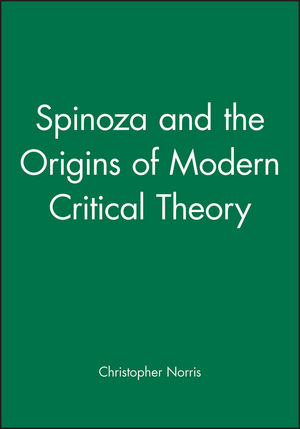Spinoza and the Origins of Modern Critical TheoryISBN: 978-0-631-17557-5
Paperback
332 pages
August 1991, Wiley-Blackwell
 This is a Print-on-Demand title. It will be printed specifically to fill your order. Please allow an additional 10-15 days delivery time. The book is not returnable.
|
||||||
This book offers a detailed account of Spinoza's influence on various schools of present-day critical thought. That influence extends from Althusserian Marxism to hermeneutics, deconstruction, narrative poetics, new historicism, and the unclassifiable writings of a thinker like Giles Deleuze. The author combines a close exegesis of Spinoza's texts with a series of chapters that trace the evolution of literary theory from its period of high scientific rigour in the mid-1960s to its latest "postmodern", neopragmatist or anti-theoretical phase. He examines the thought of Althusser, Macherey and Deleuze as well as others (including the new historicists) who have registered the impact of his pioneering work without any overt acknowledgement.
On the one hand, theorists like Althusser and Macherey could celebrate Spinoza as the first philosopher before Marx to understand the need for a riorous distinction between science (or "theoretical practice") and ideology (or the realm of lived experience subject to various forms of imaginary error of misrecognition). On the other, Deleuze makes Spinoza the hero of his crusade against theories of whatever kind - Kantian, Marxist, Freudian, post structuralist - which always end up by imposing some abstract order of concepts and categories on the libidinal flux of "desiring production", or the "body-without-organs" of anarchic instinctual drives.
On the one hand, theorists like Althusser and Macherey could celebrate Spinoza as the first philosopher before Marx to understand the need for a riorous distinction between science (or "theoretical practice") and ideology (or the realm of lived experience subject to various forms of imaginary error of misrecognition). On the other, Deleuze makes Spinoza the hero of his crusade against theories of whatever kind - Kantian, Marxist, Freudian, post structuralist - which always end up by imposing some abstract order of concepts and categories on the libidinal flux of "desiring production", or the "body-without-organs" of anarchic instinctual drives.



